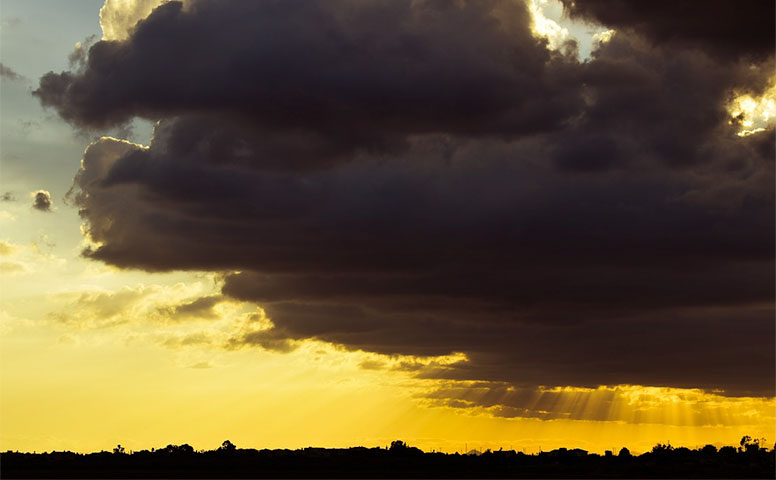11 January 2018
Danger In The Sky
Drones, air-rage, rogue balloons and more.
By Neil Tidmarsh
 Don’t look up. The sky is full of danger this week. Stay indoors. Or, if you must go out, wear a helmet. But, whatever you do, don’t go Up There…
Don’t look up. The sky is full of danger this week. Stay indoors. Or, if you must go out, wear a helmet. But, whatever you do, don’t go Up There…
From Australia comes the story of an angry bird – a peewee, or magpie-lark – which attacks shoppers and staff at a Woolworths in a coastal town south of Sydney. A court has ordered Woolworths to pay damages of $17,000 to an employee who received a serious eye-injury. There have been other attacks by the same breed of birds elsewhere in Australia – some experts believe that peewees have developed a hatred for the bush-clearing species homo sapiens for slowly and steadily destroying their habitat.
From the USA comes another story of avian violence; an eagle swooped on a dog playing in a snowy backyard in the town of Bowmanstown, Pennsylvania, seized it in its claws, and flew off with it. Luckily, the seven-year-old bichon frise called Zoe was found later that day in a road four miles away, frozen and injured but still alive, and re-united with her owner via Facebook. Experts think that predators are hunting further afield and taking greater risks to survive in the extreme winter weather conditions which climate change has brought to North America this year.
Something even more disturbing descended on rural Kenya, damaging houses and prompting reports of an alien invasion. Villagers were understandably frightened when a mysterious and massive craft (15m wide and 12m tall) came down on them in the middle of the night. It turned out to be one of Google’s high-altitude balloons which float in the empty stratosphere 12 miles above the earth to bring the internet to remote regions; strong winds had caused this one to crash land. It wasn’t alone; a farmer elsewhere in Kenya is suing Google and the government for the damage caused to his crops by thousands of curious on-lookers when they gathered to examine another Google high-altitude balloon which had crash-landed in the middle of his fields.
More seriously, there were other balloon malfunctions in Egypt; one person was killed and another 15 injured when a hot-air balloon carrying tourists over the ancient site of Luxor crashed in the desert. Extreme weather conditions have been blamed, but this tragedy is one more blow against Egypt’s embattled tourist trade – vital to its economy – which is already struggling to survive amidst terrorism and social unrest.
An even greater tragedy was somehow averted when violence broke out on a Jet Airways flight from London to Mumbai on New Year’s Day. But it wasn’t the passengers who were scrapping in this particular instance of air-rage – it was the two pilots. Fighting allegedly broke out not once but twice, and at one stage the cockpit was left unmanned and the controls were abandoned, with 324 passengers on board. The plane did somehow manage to land safely in Mumbai, but both pilots have been suspended and an investigation is underway. Meanwhile, here in the UK, the government is planning to limit the sale of alcohol in airports in an attempt to combat air-rage, incidents of which have doubled over the past year.
And all this is before we’ve even started on drones.
The US defence department’s Defence Advanced Research Projects Agency (Darpa) reported last week that it’s developing a new generation of drones and a flying aircraft carrier to launch and land them in mid-air. The drones will be armed with bombs or equipped with cameras or radar, and will be launched in swarms from a modified fighter plane, to which they will return after accomplishing their mission. They will also be able to self-destruct if they don’t return – at the moment, an enemy can steal a drone’s secret technology by capturing and reverse-engineering it. US military drones were (possibly) in the news this week as well – Syrian rebels launched a fleet of ten armed drones against the Russian airbase at Hmeimim and the naval base at Tartus, and the Kremlin is suggesting that they might have been supplied by the US. Military drones are not available on the open market and require specialist technical training and knowledge, and a US navy Poseidon reconnaissance aircraft was allegedly in the area at the time. The Pentagon has denied any involvement.
But if you think you’re safe from drones because you don’t live in a war-zone, think again.
A researcher at Harvard University reported this week on “Crashmas”, the accidents and damage caused by drones given as presents at Christmas. Many of the mishaps – injuries, breakages, getting tangled in hair or pets’ fur, etc – happened within minutes of the gadgets being unwrapped. More than 38 American states are preparing legislation to control recreational and commercial drone use, with heavy fines or even prison sentences for flying a drone while drunk and other dangerous or irresponsible uses which could threaten other citizens’ safety or privacy.
And here in the UK, the government has just announced that it’s offering a £7 million contract to any company that can come up with the technology to stop criminals smuggling drugs, weapons, phones and other contraband into prisons via drones. And some reckless genius is developing a drone to transport commuters in and out of London. I think I’ll stick to my bike, in spite of the dangers of cycling in this city (which will of course increase once I have to start looking up as well as forwards and backwards and side to side).
What to do? Dig down instead of fly up? Go underground rather than into the sky? Once more, think again. This week The Times reported that the Church of England “has officially registered ownership of 585,000 acres of underground resources”, laying “claim to minerals beneath privately owned land covering an area the size of the Lake District”. So any treasure – oil, gold, silver, coal, shale gas, pirate’s buried booty, Roman coin-hoard, rich Anglo-Saxon burial, etc – lying hidden in the ground under your house and garden may not even belong to you any more. Remember the New Testament’s ‘Parable of the Hidden Treasure’ (Matthew 13, 44)? “The kingdom of heaven is like unto a treasure hid in a field; the which when a man hath found, he hideth, and for joy thereof goeth and selleth all that he hath, and buyeth that field” only to be told by the Church of England “Hands off, that treasure’s ours!”


